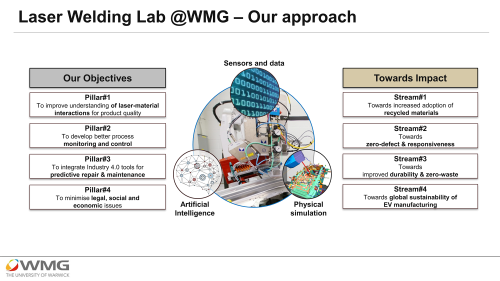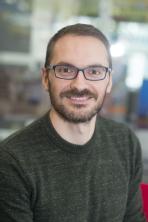Control, automation and digital commissioning of laser welding process
Research group activity
We conduct research in the area of laser welding process development, characterization and optimisation, testing and validation along with quality control of weldments using in-process monitoring sensors. The lab is equipped with low power (<1 kW) and high power (up to 10 kW) CW fiber laser systems with number of welding heads to accommodate both micro-welding on thin foils (<500 µm) and macro-welding of thick structural parts (up to 6 mm). Welding heads are integrated with state-of-the art sensors to enable in-process monitoring of weld quality; they include high speed camera with laser illumination, laser triangulation, infrared camera, photodiodes and interferometer. The group is currently project partner on several projects (both UKRI funded and industry direct research contracts) for the development and demonstration of laser welding processes for novel battery assembly systems (battery cell welding, battery busbar and module) and electric drives for future electric vehicles. The image below shows the approach and vision of the research team.
Research Area: Advanced Laser Welding Technology & Weld Quality Inspection and Control
Research Topics:
1. Material/weld characterisation
2. Process optimisation, digital twinning and process simulation
3. Process monitoring and quality control
4. Process scale-up (from concept to full scale prototype)
Current applications:
1. Automotive body-in-white components
2. Battery assembly systems and e-drives manufacturing
3. Steel, Aluminium Copper & Dissimilar metal structures
4. Laser welding of 3D printed parts (additive manufacturing)
Project Description
Laser Beam Welding (LBW) is fast becoming a key process due to its competitive processing speed, less restrictive single-sided access requirements and improved process flexibility. The high flexibility of LBW systems allows the introduction of sophisticated welding patterns, fast beam re-positioning with superior processing speed, laser power modulation and beam shaping. This flexibility has been proved successful to weld challenging materials such as copper and aluminium. However, this requires precise off-line programming, digital simulation and commissioning prior deployment to the shopfloor.
This internship is for self-driven students who want to learn new tools such as robot off-line simulation, I/O integration protocols and PLC programming. Selected students will work in a multidisciplinary team that includes material scientists/engineers, metallurgists, mechanical engineers and computational modellers. Full training will be provided.
The intern will have an opportunity to focus the work on their own interests, within the scope of the research projects currently in progress within the group. The project is also aligned with the Warwick Racing and Warwick Moto projects (one day a week).

Required Skills
Control engineering, mechanical engineering, CAD/CAM, coding/programming/PLC

